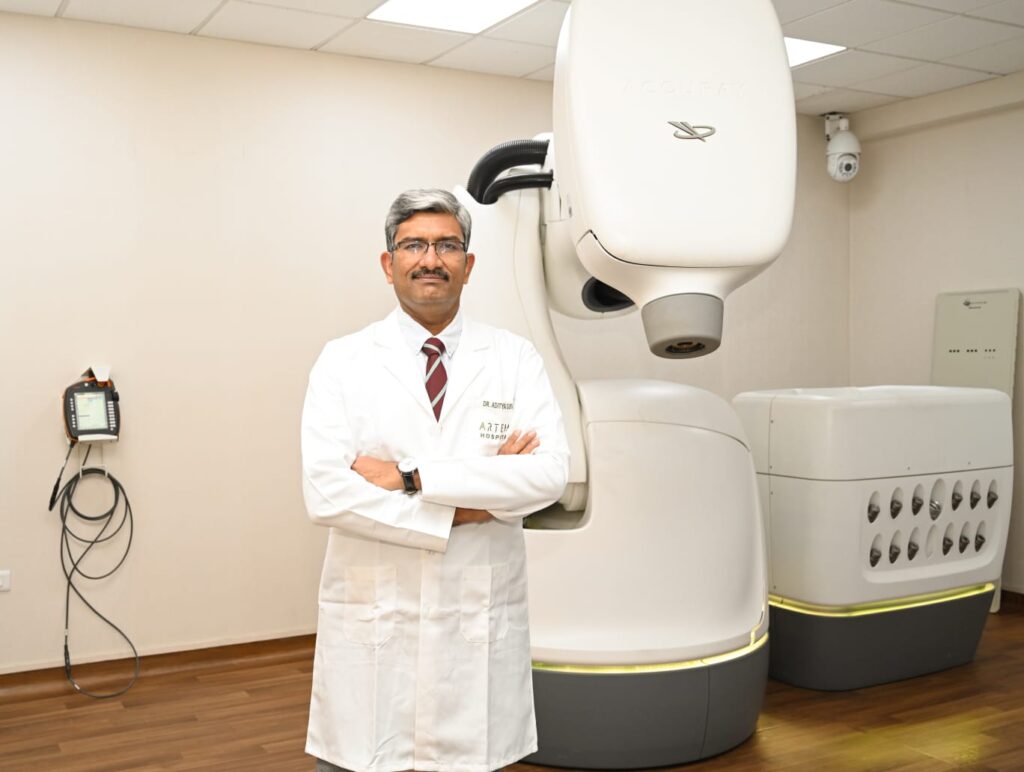
By-Dr. Aditya Gupta, Director – Neurosurgery and Cyberknife, Artemis Hospital, Gurugram
The field of neurosurgery has undergone a revolutionary transformation over the past decade, particularly with the emergence of advanced endoscopic microsurgical techniques and the evolution of radiosurgical technologies such as CyberKnife. These innovations have significantly enhanced the precision, safety, and efficacy of brain tumor treatment, offering patients new hope with fewer complications and faster recovery.
Traditionally, brain tumor surgery involved large craniotomies—removal of a significant portion of the skull—to access and remove the tumor. While effective, such procedures were associated with considerable risks including infections, blood loss, and prolonged recovery times. With the introduction of endoscopic microsurgery, the approach has become minimally invasive, involving the use of high-definition endoscopes inserted through small openings, either via natural orifices like the nose or through tiny incisions in the skull.
This technique has proven especially effective in the treatment of pituitary adenomas, craniopharyngiomas, colloid cysts, intraventricular tumors, and other deep-seated brain lesions. Using angled lenses and precise instrumentation, we can now reach regions of the brain that were once considered high-risk or inoperable, all while preserving surrounding healthy tissues.
endoscopic endonasal surgery for tumors located at the base of the skull are performed through the nasal cavity, eliminating external scars and significantly reducing hospital stay. Patients typically experience faster recovery, reduced postoperative pain, and a quicker return to normal activities.
Another significant advancement has been the integration of neuronavigation systems—akin to a GPS for the brain—which guide the surgeon with real-time, 3D imaging. Combined with high-powered microscopes and fluorescence-guided techniques, we can achieve maximal tumor resection while minimizing the risk of neurological deficits.
While surgical resection remains the gold standard for many brain tumors, not all tumors are amenable to surgery. For lesions located in eloquent areas of the brain or for patients who are unfit for surgery due to age or comorbidities, CyberKnife radiosurgery offers a non-invasive, outpatient alternative.
CyberKnife is a revolutionary robotic radiosurgery system that delivers highly focused beams of radiation to the tumor with sub-millimeter accuracy. Unlike conventional radiation therapy, which is delivered over multiple sessions, CyberKnife can often treat brain tumors in one to five sessions with minimal impact on surrounding tissues.
This technique is particularly effective for treating vestibular schwannomas (acoustic neuromas), meningiomas, brain metastases, arteriovenous malformations, and even recurrent or residual tumors following surgery. One of the standout features of CyberKnife is its ability to track the tumor in real time, adjusting the radiation beams as the patient moves slightly—this ensures continuous accuracy without the need for a rigid frame, offering unmatched patient comfort.
At Artemis Hospital, we have successfully treated hundreds of patients using CyberKnife, either as a standalone therapy or in conjunction with surgery. The synergy between microsurgical tumor debulking and radiosurgical precision allows us to optimize outcomes even in complex cases.
The integration of minimally invasive surgery with robotic radiosurgery represents the future of neuro-oncology. With continuous advancements in imaging, instrumentation, and intraoperative monitoring, we are now better equipped than ever to tackle tumors once deemed untreatable.
For patients and their families, these technologies translate into better quality of life, reduced hospitalization, and long-term disease control. The focus is no longer just on survival—but on healing with dignity, functionality, and minimal disruption to life.







